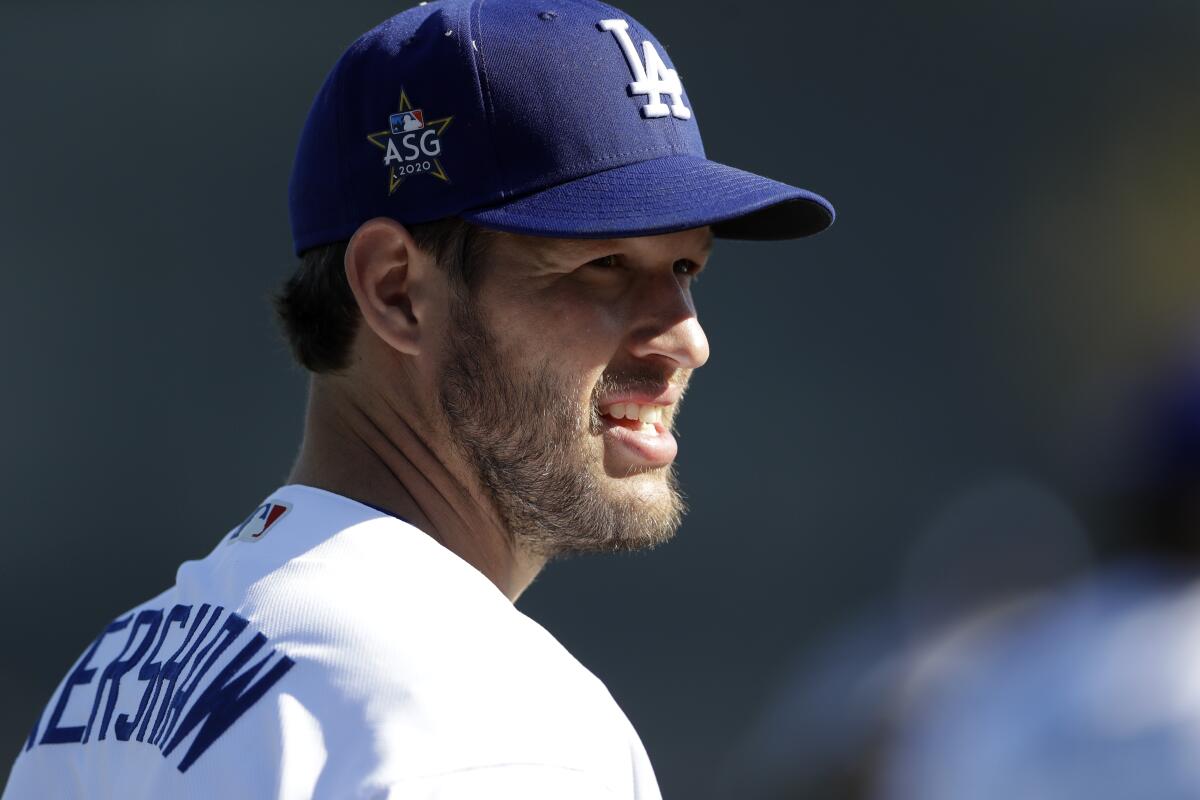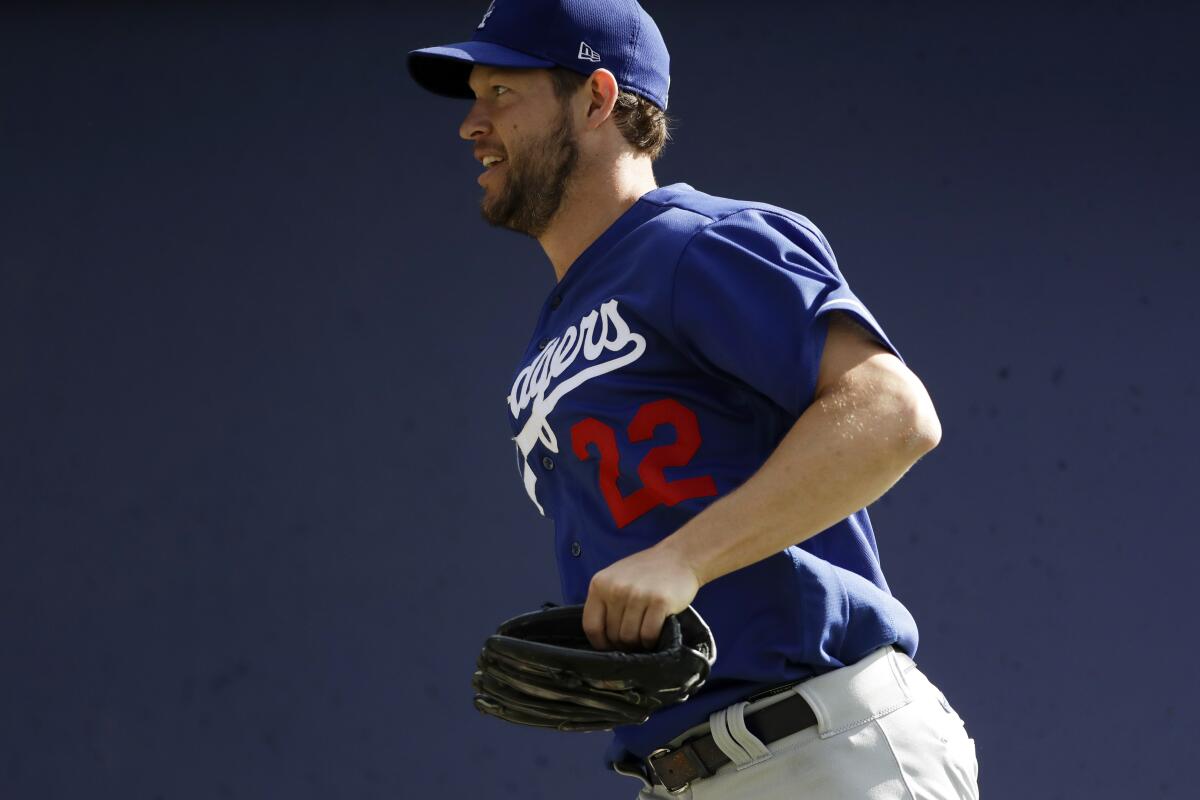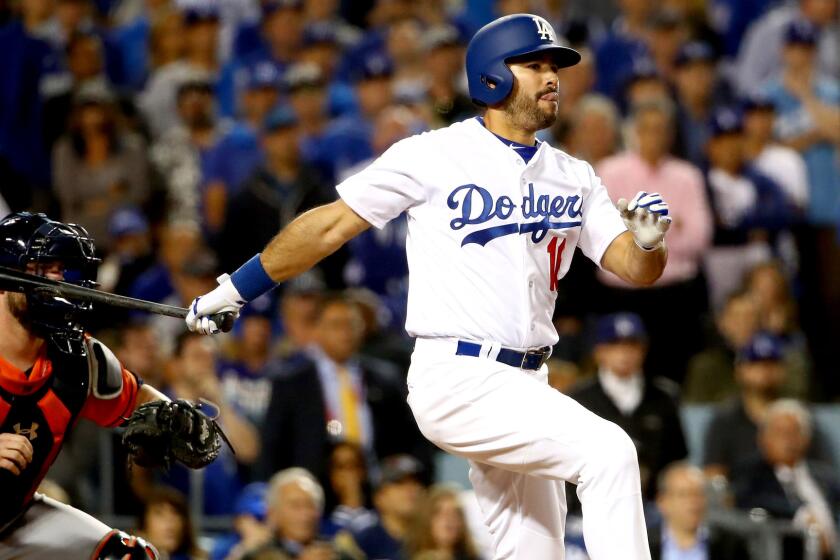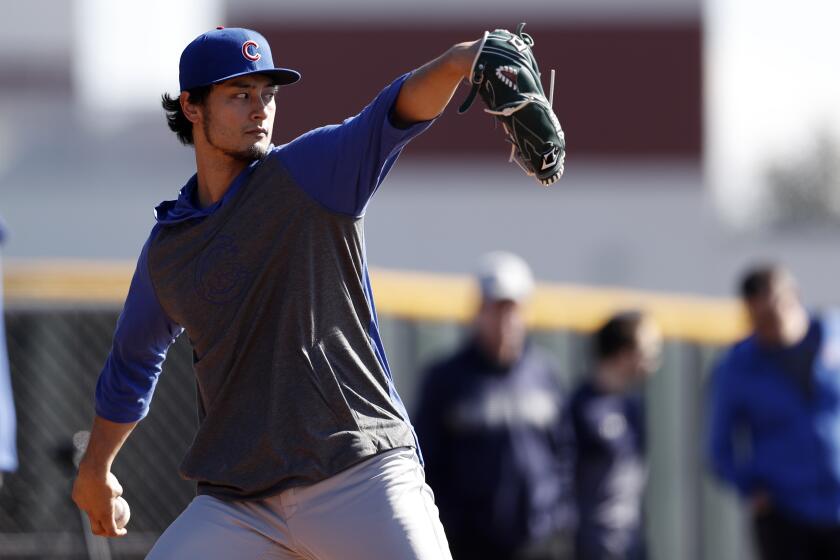Astros can’t steal Clayton Kershaw’s love for baseball

- Share via
PHOENIX — The game betrayed him.
Clayton Kershaw almost certainly doesn’t view it like that, but that’s what happened. The sport he loves fostered an environment in which con men were allowed to steal a prize he has pursued his entire career.
Yet, here he was in the Dodgers’ spring training clubhouse, only three months after details of the Houston Astros’ sign-stealing scheme surfaced, encouraging others to share his excitement over the upcoming season and reminding them of the league’s special players.
“I love baseball,” he proclaimed.
A couple of days later, Kershaw revisited the theme, speaking about how he renewed his faith in the sport after absorbing the initial shock over the Astros’ subterfuge.
Andre Ethier’s 12-year Dodgers career ended with the 2017 World Series Game 7 loss to the Houston Astros. He says the emphasis on analytics led to sign stealing.
“It’s not like a steady climb, you know what I mean?” he said, illustrating his point by slanting his right arm as if a line on a graph.
Last season ended for Kershaw similar to too many others, with crushing disappointment. He was 16-5 with a 3.03 ERA in the regular season, but was the losing pitcher in Game 2 of a National League Division Series against the Washington Nationals. The worst was still ahead. In a relief appearance in the fifth and deciding game of the series, Kershaw failed to protect a 3-1 advantage, serving up back-to-back home runs in the eighth inning that eventually led to a 7-3 defeat.
Kershaw was despondent, acknowledging that the widespread criticisms about his postseason performances were accurate. But in his moment of despair, Kershaw vowed to resume his chase of an elusive World Series championship.
“I’m not going to shy away from it,” he said. “I will be here next year and try to do the same thing I try to do every single year.”
Of course he would. None of his previous postseason heartbreaks had compromised his all-out quest for greatness. Day after day, season after season, his commitment was on display in stadiums wherever the Dodgers played, as he worked out in the outfield before many of his teammates had entered the locker room.
But the recovery process this winter was interrupted when pitcher Mike Fiers explained to the Athletic how the Astros relayed stolen signs to their batters in real time.

The scheme was in place in 2017, when the Astros defeated the Dodgers in the World Series. In Game 5 of that series, Kershaw failed to hold separate leads of four and three runs.
“Obviously, you have to start thinking about what happened,” Kershaw said. “I couldn’t decide whether that was healthy to look back on at all or not. I think I kind of just ... I don’t want to say block it out because that’s not healthy either. But I think I made my peace with it then. Whatever happened, regardless of whether it was fair or not, it already happened. I’m ready to not think about it anymore.”
Refusing to play the what-if game is one thing, however. Fully buying back into baseball is another.
And that’s what Kershaw appeared to be doing when he publicly professed his love for the sport.
He sounded as if he was talking about not only the game played between the lines, but everything that comes with it, from his off-season conditioning program to spending five weeks with teammates in the desert to prepare for the upcoming season.
But how could he reinvest all of himself to a pursuit proven to be compromised? He believed he was playing by one set of rules this entire time; at least one of his opponents was playing by another.
Yu Darvish, who the Astros crushed in the 2017 World Series, says consequences would be greater if a similar sign-stealing scandal occurred in his native Japan, columnist Dylan Hernandez writes.
“That’s a fair question,” Kershaw said.
Kershaw said the controversy made him reflect back to middle school and high school. Baseball’s steroid scandal made him think about how he felt about the sport.
“I just wanted to play baseball,” he said.
He continued, “You talk about the credibility of the game, and rightfully so. It’s being questioned, but it was an isolated incident with one team and that won’t happen again. We’re going to put measures in so that it won’t happen again. This season won’t be like 2017. Everybody’s concerned or guessed about 2018 or 2019, but nothing was proven. You have to assume everything was fair.”
But baseball as an institution now has major credibility problems. How can he trust it?
“You could be negative, I guess,” he said.
He added playfully, “Don’t be negative.”
The Astros had the technology and guile to devise a plan to steal and relay signs that went beyond what other teams imagined possible. Doesn’t common sense point to them, or another team, figuring out a way to do something similar while avoiding detection?
“That’s calling every other team stupid,” Kershaw said. “I think it’s more of a moral issue. I don’t think they’ll do it again. I believe that.”
But some players have continued using steroids after the implementation of testing.
Kershaw countered by pointing to how taking performance-enhancing drugs as something cheating players do individually. Real-time sign-stealing is a collective effort.
“Somebody’s going to speak up,” he said. “You can’t hide it.”
Told his view of humanity was admirably positive, Kershaw replied, “I’ve never really thought of it. But, yeah, I guess so.”
In fact, Kershaw said he believed the fear of losing the respect of other players would be enough of a deterrent to prevent potential cheaters from crossing the line in the future.
“The credibility you have with the league and teammates … that means a lot to me,” Kershaw said. “I would hope that means a lot to a lot of players. I can’t imagine that it feels good to hear Mike Trout say that he’s disappointed in you.”
So, as he’s done so many times before, Kershaw looks ahead. Which makes sense. Pitching more than 2,400 innings in the major leagues requires more than physical durability. Behind it has to be an equally resilient mentality, in this particular case an especially optimistic one. He will give everything of himself to the game once more, trusting that it won’t be rigged this time.
And maybe, just maybe, this will be the year he captures baseball’s ultimate prize.
More to Read
Are you a true-blue fan?
Get our Dodgers Dugout newsletter for insights, news and much more.
You may occasionally receive promotional content from the Los Angeles Times.













